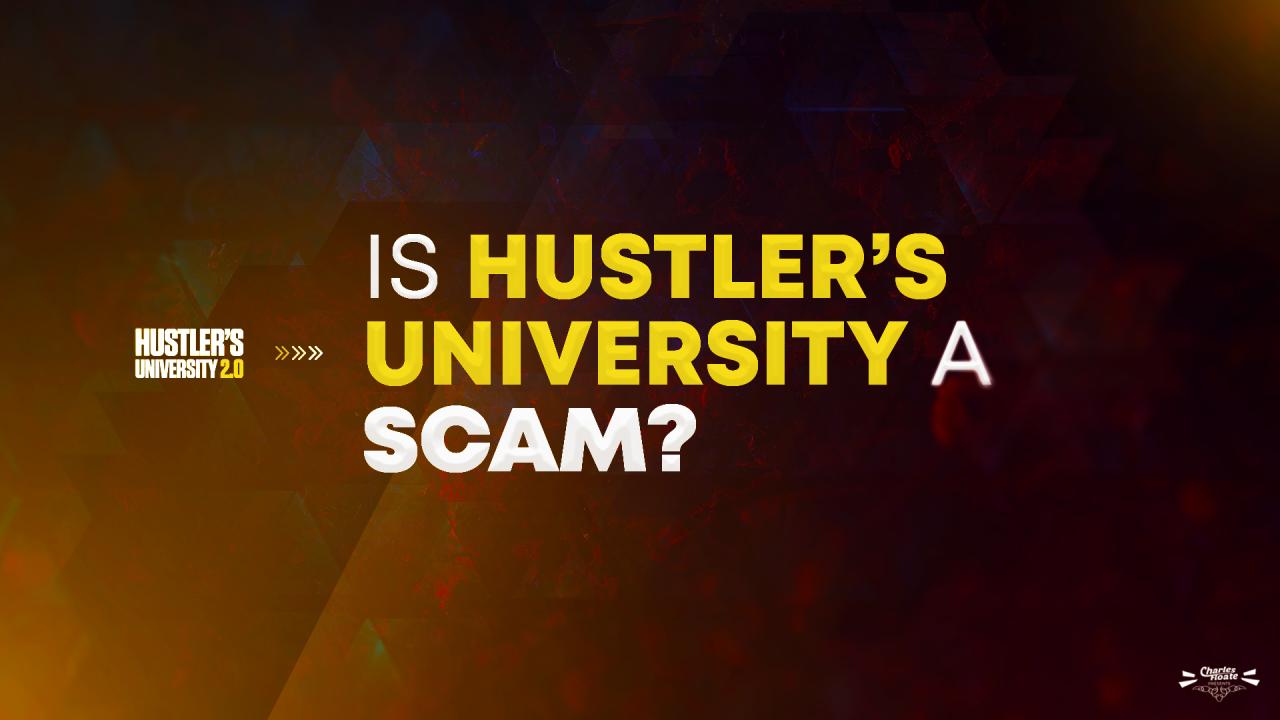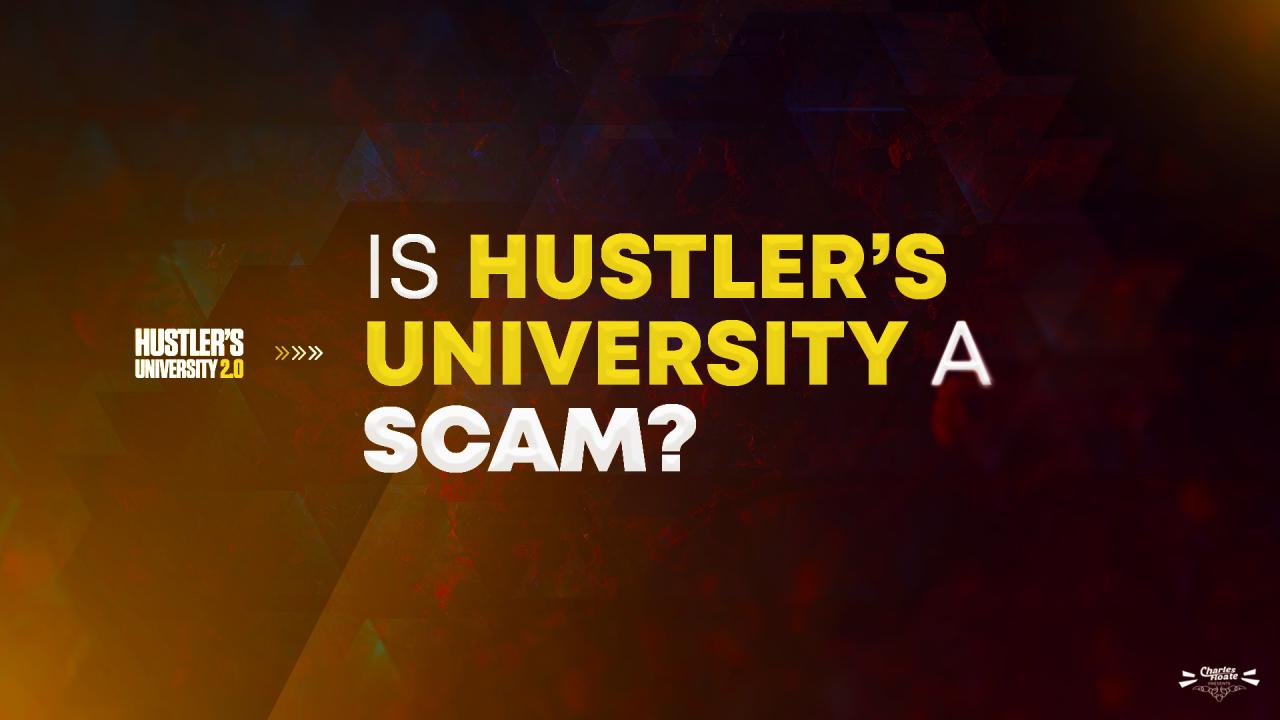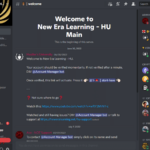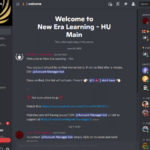Can you join Hustlers University under 18? This question has sparked debate and raised concerns about the suitability of such programs for minors. Hustlers University, known for its controversial online courses focused on business and entrepreneurship, has garnered attention for its target audience and the potential impact on young individuals.
The program’s content, which includes topics like marketing, sales, and online business strategies, has been scrutinized for its appropriateness for underage individuals. While the program claims to provide valuable skills and knowledge, critics argue that the material may be too advanced or inappropriate for minors, raising concerns about potential risks and ethical implications.
Educational Content and Suitability

Hustlers University (HU) claims to offer courses on various topics related to making money online, including e-commerce, affiliate marketing, and social media marketing. However, the educational value and suitability of this content for minors require careful consideration.
Educational Content Analysis
The educational content provided by HU is primarily focused on practical skills and strategies for generating income online. While some of these skills might be valuable in the long run, the program’s emphasis on quick-money schemes and shortcuts raises concerns about its educational integrity. Many of the courses promote methods that are often associated with unethical or even illegal practices, such as:
- Exploiting loopholes: HU encourages students to find and exploit loopholes in various systems to gain an advantage. This approach might be considered unethical and could lead to legal issues.
- Promoting aggressive sales tactics: Some courses emphasize aggressive sales techniques that could be perceived as manipulative or deceptive. This could negatively impact students’ ethical development.
- Over-promising quick results: HU’s marketing materials often promote unrealistic expectations of rapid wealth generation. This can create false hope and disappointment among students, particularly those who are inexperienced and vulnerable.
Potential Risks and Concerns for Minors
Exposing minors to the content and practices promoted by HU could have several negative consequences:
- Exposure to unethical practices: The program’s focus on shortcuts and aggressive tactics could normalize unethical behavior in minors, potentially leading to them engaging in similar practices in their personal and professional lives.
- Financial risks: Minors are particularly vulnerable to financial scams and exploitation. HU’s emphasis on quick money-making schemes could lead to minors making risky financial decisions without proper guidance or understanding of the potential consequences.
- Psychological impact: The program’s unrealistic expectations and potentially misleading information could negatively impact minors’ self-esteem and mental health, leading to feelings of inadequacy or failure if they fail to achieve the promised results.
Comparison with Educational Standards for Minors
The content and practices promoted by HU starkly contrast with the educational standards for minors. Educational institutions typically prioritize the development of critical thinking, ethical decision-making, and responsible financial management. HU’s focus on shortcuts and quick money-making schemes contradicts these principles, potentially hindering the development of valuable life skills in minors.
Alternatives for Minors
While Hustlers University might seem appealing, it’s crucial to remember that it’s not designed for minors. There are various alternative programs specifically tailored for young entrepreneurs and learners, offering valuable skills and experiences.
Programs Designed for Minors
These programs offer a structured learning environment, mentorship, and resources for young individuals to explore their entrepreneurial interests.
- Young Entrepreneurs Academy (YEA!): YEA! is a comprehensive program that empowers young people aged 11-18 to start and run their own businesses. It provides hands-on training, mentorship, and networking opportunities. YEA! has a strong focus on developing business skills, including marketing, finance, and operations.
- Junior Achievement (JA): JA is a global non-profit organization that offers programs for students of all ages, focusing on financial literacy, work readiness, and entrepreneurship. JA programs provide a practical understanding of business concepts and help students develop essential skills for success.
- The Biz Kids: The Biz Kids program provides online and in-person workshops, courses, and resources for young entrepreneurs aged 8-18. They offer a variety of programs covering topics like business planning, marketing, and social media.
- Teen Entrepreneur Program: This program, often offered through local community centers or schools, provides guidance and support to young entrepreneurs. It might involve workshops, mentoring sessions, and access to resources.
Comparing Alternatives to Hustlers University
| Program | Target Age Group | Key Features |
|—|—|—|
| Young Entrepreneurs Academy (YEA!) | 11-18 | Comprehensive business training, mentorship, networking opportunities, and real-world experience. |
| Junior Achievement (JA) | All ages | Focus on financial literacy, work readiness, and entrepreneurship, with practical business concepts and skill development. |
| The Biz Kids | 8-18 | Online and in-person workshops, courses, and resources covering business planning, marketing, and social media. |
| Teen Entrepreneur Program | Varies | Guidance and support, workshops, mentoring sessions, and access to resources. |
Ethical Considerations

Allowing minors to participate in Hustlers University raises significant ethical concerns. While the program may offer valuable skills and knowledge, its focus on business and entrepreneurship, particularly in areas like online marketing and potentially “grey-area” strategies, could have unintended consequences for young individuals.
Potential Impact on Development and Well-being
The program’s emphasis on quick profits and aggressive marketing tactics might contradict the long-term developmental needs of minors. Exposure to such strategies could potentially:
- Promote a Short-Term Mindset: Minors may prioritize immediate financial gains over long-term educational goals or career development, hindering their overall growth.
- Cultivate an Unhealthy Relationship with Money: The program’s focus on “hustling” could lead to an unhealthy obsession with money and potentially encourage unethical practices, such as exploiting others or engaging in risky ventures.
- Undermine Moral Development: Exposure to aggressive marketing techniques and potentially questionable business practices might compromise a minor’s developing sense of ethics and social responsibility.
Ethical Dilemmas, Can you join hustlers university under 18
The program’s content and structure might present various ethical dilemmas, such as:
- Age-Appropriate Content: The program’s content might not be appropriate for minors, potentially exposing them to mature themes or controversial topics that could be detrimental to their development.
- Exploitation of Minors: There’s a potential risk of minors being exploited by the program or its instructors, particularly if they are encouraged to engage in activities that are beyond their legal or ethical boundaries.
- Privacy and Data Security: The program’s collection and use of personal data from minors raise concerns about privacy and potential misuse of sensitive information.
Role of Parents and Educators
Navigating the digital world can be challenging, especially for minors. Parents and educators play a crucial role in guiding young people towards safe and responsible online experiences.
Parental Guidance in Online Programs
Parents have a vital responsibility to guide their children’s online activities, including their involvement in online programs. They should actively participate in their children’s digital lives, fostering open communication and establishing clear boundaries.
- Open Communication: Encourage open conversations about online activities, risks, and responsible online behavior. Create a safe space for children to share concerns and seek guidance.
- Setting Boundaries: Establish clear rules and guidelines for online usage, including time limits, appropriate content, and interactions with others. Use parental controls to restrict access to inappropriate websites and content.
- Monitoring Online Activities: Monitor their children’s online activities, including websites visited, apps used, and social media interactions. Engage in conversations about online experiences to understand their interests and potential risks.
- Educating about Online Safety: Teach children about online safety, including cyberbullying, privacy, and the dangers of sharing personal information. Explain the importance of using strong passwords and being cautious about online interactions.
- Promoting Digital Literacy: Encourage critical thinking and media literacy skills. Help children understand the difference between reliable and unreliable information and how to evaluate online sources.
Educator’s Role in Informing Students
Educators have a responsibility to inform students about online opportunities and risks, promoting responsible online behavior. They can incorporate digital literacy into their curriculum, teaching students about online safety, privacy, and critical thinking skills.
- Integrating Digital Literacy: Incorporate digital literacy into classroom activities, teaching students about online safety, privacy, and responsible online behavior.
- Promoting Critical Thinking: Encourage critical thinking and media literacy skills. Teach students how to evaluate online information, identify fake news, and understand the implications of sharing personal information.
- Raising Awareness of Online Risks: Discuss common online risks, such as cyberbullying, online predators, and the dangers of sharing personal information. Provide resources and tools for students to protect themselves.
- Collaborating with Parents: Partner with parents to create a supportive and educational environment for students. Communicate about online safety concerns and collaborate on strategies for promoting responsible online behavior.
- Utilizing Technology for Learning: Use technology as a tool for learning, but ensure that students are using it responsibly and safely. Implement appropriate safety measures and guidelines for online activities in the classroom.
Resources for Online Safety
Numerous resources and organizations provide guidance on online safety for minors. These resources can empower parents and educators to protect children in the digital world.
- National Center for Missing and Exploited Children (NCMEC): Provides resources and support for parents, educators, and law enforcement regarding child safety online. Offers information on cyberbullying, online predators, and reporting online abuse. https://www.missingkids.org/
- Internet Watch Foundation (IWF): A global organization dedicated to tackling online child sexual abuse content. Provides resources and support for parents, educators, and internet service providers. https://www.iwf.org.uk/
- Cyberbullying Research Center: A research organization dedicated to understanding and preventing cyberbullying. Provides resources and support for parents, educators, and students. https://cyberbullying.org/
- Common Sense Media: Provides reviews and ratings of movies, TV shows, video games, and apps for families. Offers resources and advice on digital media and online safety. https://www.commonsensemedia.org/
- Federal Trade Commission (FTC): Provides information and resources on consumer protection, including online privacy and identity theft. Offers advice on protecting children’s privacy online. https://www.ftc.gov/
The Future of Online Learning for Minors
The realm of online learning for minors is experiencing a dynamic transformation, fueled by technological advancements and evolving educational needs. As digital platforms become increasingly sophisticated and accessible, the opportunities for engaging and personalized learning experiences for young learners are expanding rapidly. However, alongside this progress, significant challenges arise in ensuring age-appropriateness, safety, and responsible educational practices.
Trends and Challenges in Online Education for Minors
The online learning landscape for minors is characterized by several prominent trends and challenges.
- Personalized Learning Pathways: Online platforms are increasingly offering tailored learning experiences based on individual student needs and learning styles. This personalized approach can cater to diverse learning preferences and pace, empowering students to take ownership of their education. However, ensuring the quality and rigor of these personalized pathways is crucial to maintain academic standards.
- Interactive and Gamified Learning: Online platforms are employing interactive elements, gamification, and virtual reality to enhance engagement and make learning more enjoyable for minors. These approaches can motivate students and foster a love for learning, but it’s important to strike a balance between entertainment and educational value.
- Emerging Technologies: Artificial intelligence (AI), virtual reality (VR), and augmented reality (AR) are transforming the online learning experience. AI-powered tutors can provide personalized feedback and support, while VR and AR can create immersive and engaging learning environments. However, ethical considerations regarding data privacy, bias in AI algorithms, and the potential for digital addiction need careful attention.
- Accessibility and Equity: Online learning has the potential to bridge geographical and socioeconomic gaps in education, providing access to quality learning opportunities for all. However, disparities in internet access, device availability, and digital literacy can create barriers to participation, requiring targeted interventions and support.
Catering to the Needs of Minors
To effectively cater to the needs of minors in the evolving online learning landscape, platforms should prioritize the following:
- Age-Appropriate Content and Activities: Platforms must ensure that all content and activities are aligned with the developmental stage and maturity level of the target audience. This includes carefully curating materials, setting appropriate time limits, and implementing robust content moderation systems.
- Safety and Privacy Measures: Robust safety and privacy measures are essential to protect minors from online risks. This includes implementing strong security protocols, age verification systems, and clear guidelines on data collection and usage. Platforms should also prioritize the development of robust mechanisms for reporting and addressing any instances of cyberbullying or harassment.
- Parental Involvement and Collaboration: Effective online learning for minors requires active parental involvement. Platforms should provide tools and resources for parents to monitor their children’s online activities, track their progress, and communicate with educators. Clear communication channels and regular updates are crucial to foster a collaborative learning environment.
- Social and Emotional Learning (SEL): Online learning platforms can play a significant role in promoting SEL skills, such as empathy, communication, and conflict resolution. Integrating SEL activities and resources into the curriculum can help students develop essential life skills and navigate the complexities of the digital world.
Legal and Regulatory Framework: Can You Join Hustlers University Under 18
The legal and regulatory landscape surrounding online learning programs for minors is complex and evolving. Laws and regulations aim to balance the benefits of online education with the need to protect children’s privacy, safety, and well-being.
Laws and Regulations Governing Online Activities for Minors
The participation of minors in online activities, including online learning programs, is subject to various laws and regulations. These laws are designed to protect children from online risks such as cyberbullying, inappropriate content, and privacy violations.
- Children’s Online Privacy Protection Act (COPPA): This U.S. federal law regulates the collection, use, and disclosure of personal information from children under 13 by websites and online services. It requires websites to obtain verifiable parental consent before collecting, using, or disclosing personal information from children.
- General Data Protection Regulation (GDPR): This European Union regulation aims to protect the personal data of all individuals, including children. It imposes strict rules on how organizations can collect, process, and store personal data, with specific provisions for children’s data.
- Family Educational Rights and Privacy Act (FERPA): This U.S. federal law protects the privacy of student education records. It restricts the disclosure of student information without parental consent.
- State Laws: Many states have their own laws and regulations governing online activities for minors, which may address issues such as cyberbullying, online safety, and access to age-restricted content.
Role of Government Agencies
Government agencies play a crucial role in overseeing the safety and security of online programs for minors. They monitor compliance with relevant laws and regulations, investigate complaints, and provide guidance to online platforms and educational institutions.
- Federal Trade Commission (FTC): The FTC enforces COPPA and other consumer protection laws related to online privacy and security.
- Department of Education (DOE): The DOE provides guidance and resources to schools and educational institutions on issues related to online learning and student privacy.
- Federal Communications Commission (FCC): The FCC regulates telecommunications services, including internet service providers, and addresses issues related to online safety and child protection.
- State Attorneys General: State attorneys general have the authority to enforce state laws related to online activities for minors, including laws addressing cyberbullying and online safety.
International Standards and Frameworks
International organizations and governments are working to develop and implement standards and frameworks for online safety and child protection.
- United Nations Convention on the Rights of the Child (CRC): The CRC recognizes the right of children to access information and participate in online activities, but also emphasizes the need to protect children from exploitation, abuse, and harm.
- Council of Europe Convention on Cybercrime: This international treaty provides a framework for cooperation between countries to combat cybercrime, including crimes against children.
Ultimately, the decision of whether or not to allow minors to participate in Hustlers University rests with parents and guardians. A thorough understanding of the program’s content, age requirements, and potential risks is crucial before making any decisions. Open communication with children about online opportunities and risks, as well as the availability of alternative educational programs designed for minors, are essential factors to consider.
While Hustlers University might seem appealing, it’s important to remember that financial decisions, especially those involving income, require careful consideration. If you’re under 18, it’s best to consult with a trusted adult or seek guidance from a professional, like a financial tax advisor near you. They can help you understand the complexities of taxes and investments, ensuring you make informed choices that align with your age and financial goals.
Remember, financial literacy is crucial, especially when navigating online ventures like Hustlers University.
While Hustlers University might seem appealing, remember that it’s crucial to have a solid foundation in financial literacy before diving into any entrepreneurial endeavors. If you’re under 18, consider exploring options like taking financial advisor courses near me to gain valuable knowledge and skills. These courses can provide you with a strong understanding of financial principles, which can be incredibly beneficial in your journey towards financial independence, regardless of your age or chosen path.







